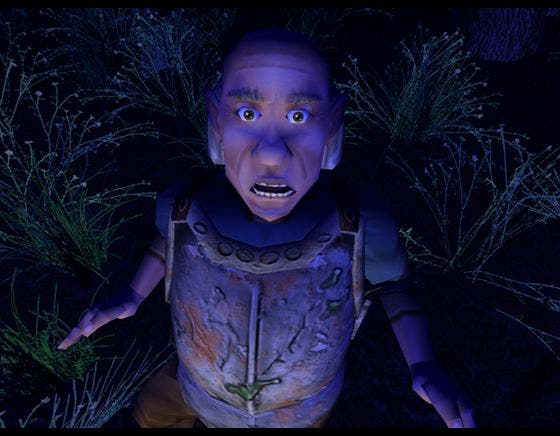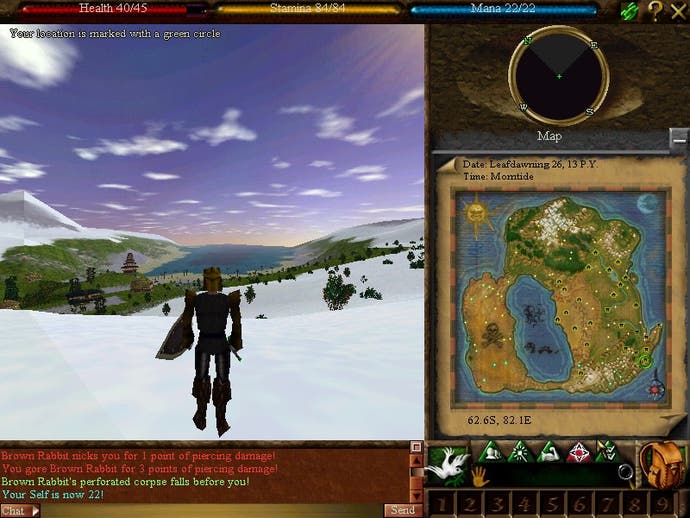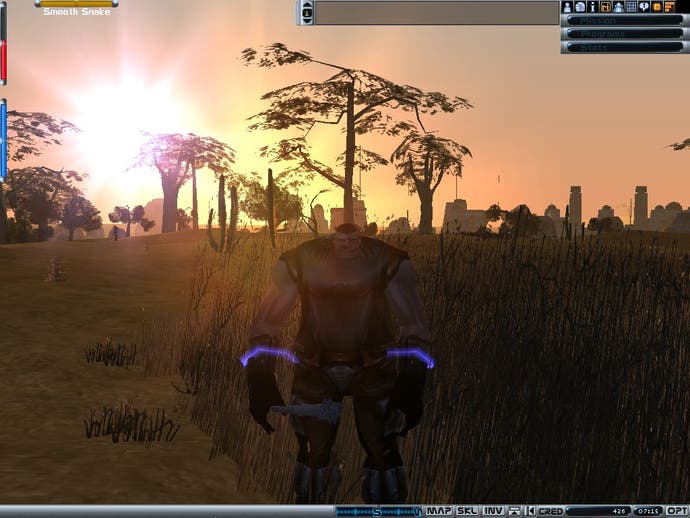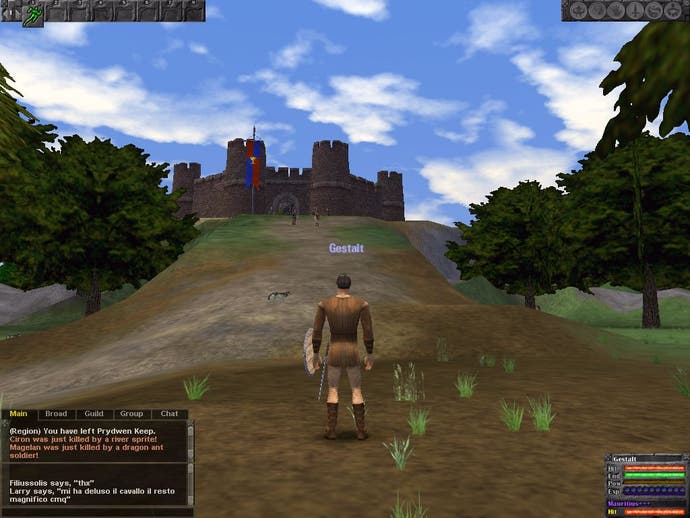Mostly Pointless
Article - Gestalt takes a look at what's wrong with the massively multiplayer role-playing genre
Back in the early 1990s games like Dune II, Command & Conquer and Warcraft spawned an entire new genre of real-time strategy games focused on resource gathering, base building and unit construction. Over the next few years the market was flooded with bland RTS clones, most of them rehashing the same basic ideas without adding anything new to the formula. Flash forward to 2002 and the massively multiplayer role-playing genre is at the same stage. Everyone from Blizzard to Squaresoft is jumping on the bandwagon, dozens of games are under development, and many of them show a startling lack of innovation.

Hollow
It doesn't help that the current crop of MMRPGs are mostly bland, shallow and ultimately futile. The only connection they have with more convential role-playing games is that you can run around killing monsters, gaining experience points and raising your stats. Unfortunately that's about all you can do, as developers seem to have lost track of what a role-playing game is all about. There is no story, no role-playing, no exploration, no character development and no real sense of progression beyond the race to reach the next level and raise your stats. And when you do reach the next level all it means is that you can go out and kill some slightly more powerful monsters, earn more experience points and go up another level. To quote Denis Leary, "Have we turned into gerbils? People are paying money to walk up invisible steps over and over again." Once you realise how pointless this level treadmill is and understand that however long you spend playing the game you will never actually achieve or change anything, the attraction tends to rapidly wear off. There isn't even any real skill involved in most MMRPGs; combat is generally just a case of pointing, clicking and then sitting back and watching. Instead your success in the game largely depends on how much time you can afford to pour into it. The more time you spend on the game, the more attached you become to your character and any in-game friends, and the harder it is to kick the habit. This isn't a game. This is a drug that destroys your life and empties your bank account.

No More Heroes
Part of the problem is the very definition of the genre. In a single-player role-playing game you are the hero who can change the world. In a massively multiplayer game you are just one of a hundred thousand wannabe heroes, all scrambling to reach the next level. At the moment it's almost impossible for a single player or guild to make any difference in a massively multiplayer game, even on a local scale. The games are all static and rigidly pre-programmed, with monsters that respawn regularly in the exact same spot every time however often you kill them, shops that generally buy and sell goods at the same price however often you dump your loot on them, and dungeons that endlessly spawn the same treasure however often you steal it. In an effort to make their worlds more interesting, some developers have introduced on-going storylines into their games. The problem is that all of this new content has to be written, developed and maintained by somebody, which means that even the most epic of plots is generally reduced to a few new monsters and dungeons which are added at pre-determined intervals rather than based on the actions of the players. The nature of these story-led events combined with the clunky hand-me-down D&D inspired rules used in most current MMRPGs also means that involvement is usually limited to high level characters.

Stalemate
The same is true of organised player vs player combat, such as the guerilla war between Omni-Tek and the Clans which forms the basis of Anarchy Online's storyline, or the constant fighting amongst rival factions seen in Dark Ages of Camelot. Because your effectiveness in combat depends on your level, which in turn largely comes down to how long you have spent playing the game, warfare tends to be something for high level characters to do when they get bored of levelling. This means that to take part in the war you must first spend days or even weeks running around killing monsters so that when you head off to the front you won't get slaughtered five seconds after entering the battle. Warfare is also utterly pointless in current MMRPGs because they are all built around fundamentally static worlds, which means that you have nothing to gain. You can't capture an enemy town and occupy it yourself, all you can do is kill the AI guards and terrorise the natives until you get bored or the opposition mounts a counter-attack and drives you off. Taking part in these raids might be enjoyable for a while, and it certainly beats the day-to-day grind of hunting, but like levelling it's an ultimately futile pursuit. However large and well-organised your army and however hard you try, you will never change anything. You are utterly insignificant.

Brave New World?
At the moment MMRPGs are static, lifeless worlds where nothing ever changes unless a programmer edits it by hand. With a limited staff to code in these special events and new features, inevitably very little actually happens and the game never really reacts to the actions of the players. It doesn't have to be this way. For a few years back in the mid 1990s "emergent gameplay" was every developer's favourite buzzword. The idea was that you could code simple rules into a game and complex behaviour would emerge from it in reaction to the player's actions. In the context of an MMRPG this means that instead of having to code every little event by hand, the game could be left to run itself, with the developers just tweaking the results and handling the overall storyline and big world-changing events. Even something as simple as the addition of a supply-and-demand economy, monsters that move around, a basic ecosystem or a dynamic climate could have a major effect on the game. What does this mean for the player? A whole new world full of interesting, non-repetitive things to do. A world which you can influence, whatever level you are. How does this work? Well, imagine if you will that you are a humble newcomer to the land of McGuffin. A recent influx of newbies has left the local rabbit population dangerously depleted and the wolves in the nearby woods are getting hungry and snacking on the village's farmers. You and a band of intrepid adventurers venture into the woods to put an end to this lupine menace, and after an epic battle between man and beast you emerge victorious. Sitting in the local pub later quaffing an ale, you regale your fellow players with the story of how you and your friends took on the snarling wolves and saved the village. The chances are that five miles down the road at the next village nobody will give a damn, but you have at least achieved something and changed the world in which you live, on however small a scale.
Conclusion
This might sound like pure fantasy today, but bear in mind that an average MMRPG generally takes at least three years to go from drawing board to shop shelf. Developers starting on new games today can look forward to running them on servers four times faster than anything currently on the market. Simply using that extra processing power to create bigger worlds for more players isn't going to cut it. I'd argue that the answer is smaller, more compact, more dynamic worlds with a higher density of cool stuff to do and less focus on endless levelling. I'd like to think I'm not alone on this.
-







